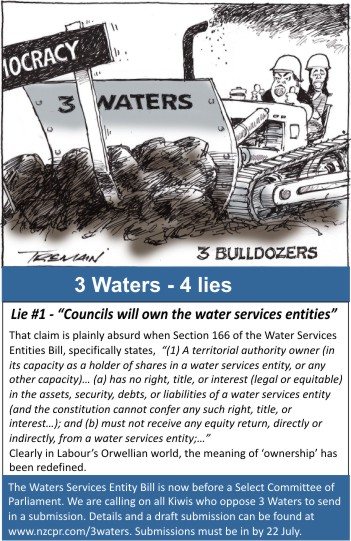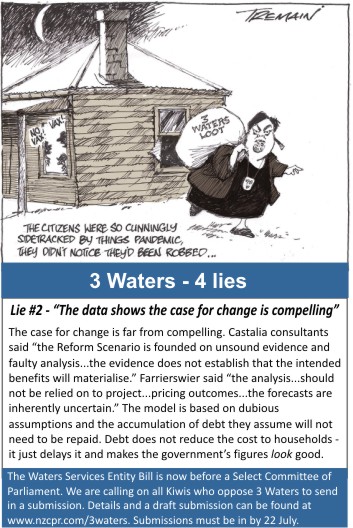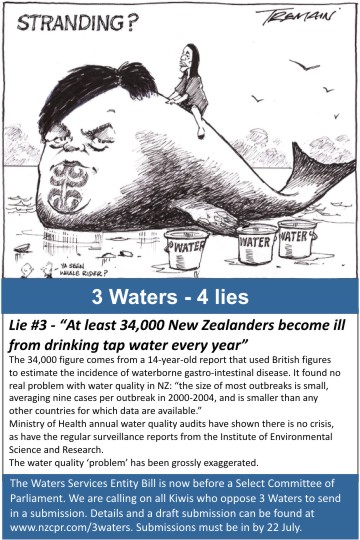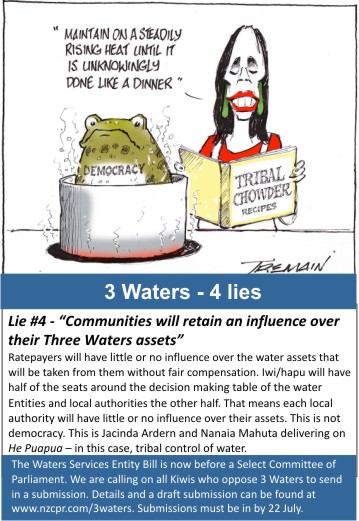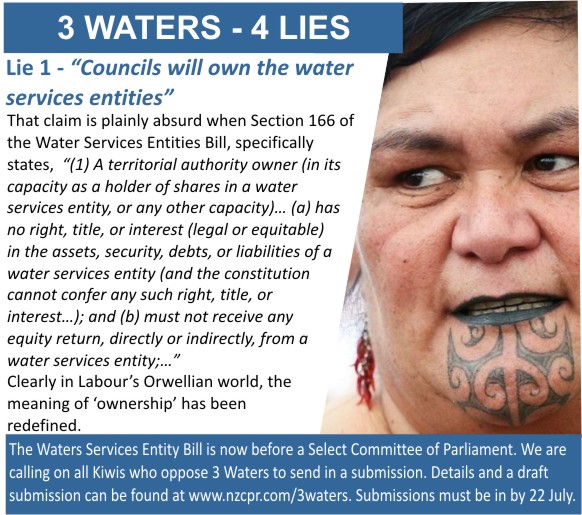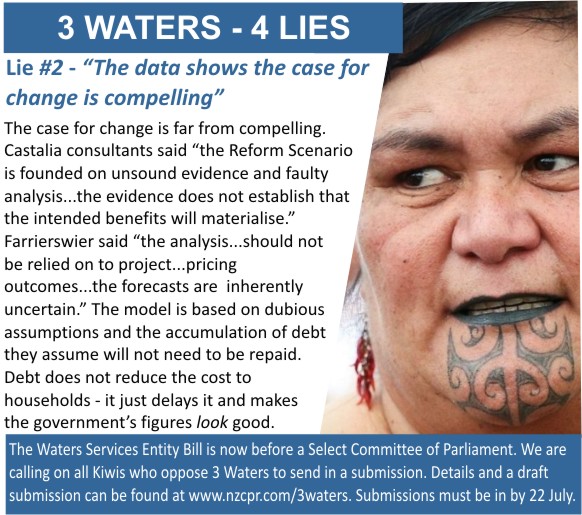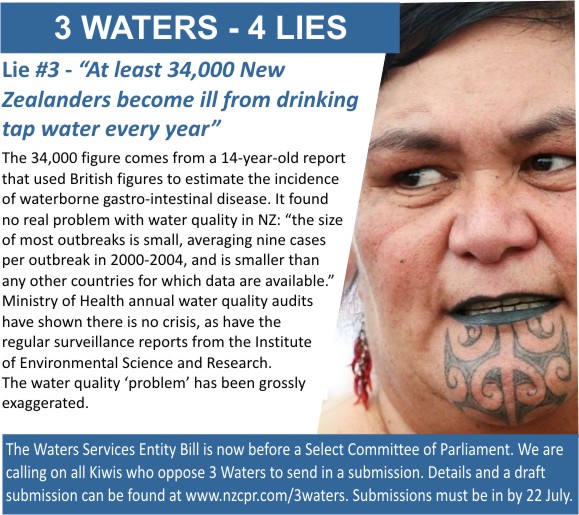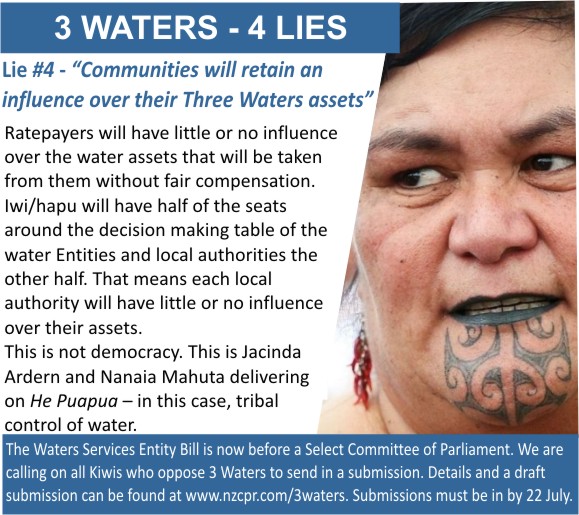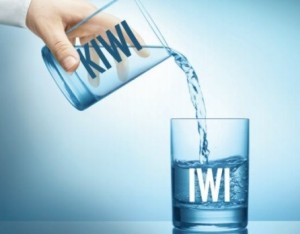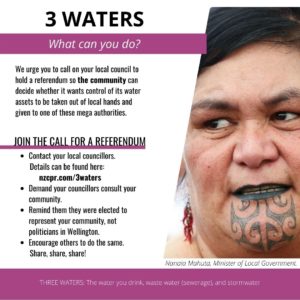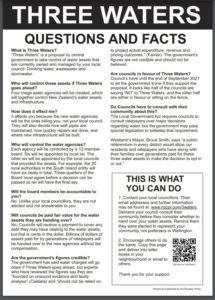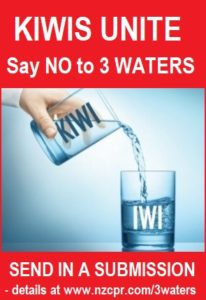 “SAY NO TO 3 WATERS!”
“SAY NO TO 3 WATERS!”
The Water Services Entities Bill has now had its first reading in Parliament and is open for submissions.
The Bill creates the four regional mega-entities that will take over freshwater, stormwater, and wastewater services appropriated from local councils.
We are encouraging everyone opposed to Three Waters to send in a submission by the 22nd of July.
A big turnout against the Bill would test the resolve of Labour MPs and send an important signal that they ignore the wishes of the community at their peril.
Our NZCPR analysis of the Bill can be found HERE
Frank Newman’s excellent evaluations are HERE and HERE
The link to read the Bill and send in your submission is HERE
Our free newsletter is how we keep in touch – you can register HERE
URGENT: Last chance to oppose Three Waters…
Submissions on the Three Waters Bill to confiscate local council water assets without fair compensation close this Friday 22 July. If you haven’t already sent in your submission opposing the Bill, this is your last chance to join Kiwis up and down the country, who are uniting to say “NO to Three Waters”.
To send in a quick submission, please follow these three steps:
1. Copy the following text as the basis of your submission:
I oppose the Water Services Entities Bill and ask the Select Committee to recommend that it be withdrawn on the basis that it is contrary to the public interest and harmful to democracy.
My concerns include:
– Communities have not been properly consulted over the proposals
– The modelling and assumptions cannot be relied on
– The estimates of costs to water users cannot be trusted
– The growing debt will create a huge burden for future generations
– The co-governance arrangements are discriminatory and anti-democratic.The Bill should not proceed.
2. Now visit the Bill’s submission portal HERE
3. Follow the prompts then paste* in your submission when asked to do so – and please feel free to modify it to reflect your own views.
That’s all there is to it. Please encourage as many people as you can to send in submissions. The direct link to this campaign page is here: www.nzcpr.com/3waters
*Please note: keyboard shortcuts may help with copying and pasting – highlight the text then press CONTROL C to copy and CTRL V to paste.
More details on submissions and Three Waters:
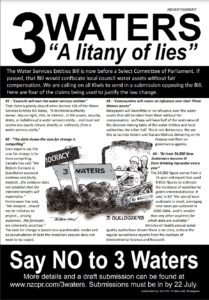
Here is our full page Three Water advertisement calling for submissions opposing the Bill that is being published in newspapers around the country – read the ad on the website by clicking HERE
THREE SIMPLE STEPS TO SEND IN A SUBMISSION
- Prepare your submission using the template below
- Visit the Bill’s Parliamentary page HERE and click the submission portal
- Enter your contact details and copy and paste your submission
That’s all there is too it. By doing that, you are standing up for democracy – fighting against a government-orchestrated tribal takeover of crucial water services and assets.
Please help us spread the word and encourage as many people as you can to send in submission – the direct link to this page is here: www.nzcpr.com/3waters
SUBMISSION TEMPLATE
Here is a submission template for you to use. The concerns listed are just a guide – please add in your own concerns about the Bill that you want to raise with the Select Committee. Also, don’t forget to fill in your details before sending it in as a submission. Furthermore, please note that hard copy submissions can be mailed (freepost) and if you have any difficulties making your submission, the Committee Secretariat can help – phone 04-817-9520.
[DATE]
Committee Secretariat
Finance and Expenditure Committee
Parliament Buildings
Wellington
Dear Sir,
Thank you for providing the opportunity to make a submission on the Water Services Entities Bill.
This submission is on behalf of [NAME].
I oppose the Bill and ask the Select Committee to recommend that it be withdrawn on the basis that it is contrary to the public interest and harmful to democracy.
My concerns include:
- Communities have not been consulted over the proposed confiscation of ratepayer funded infrastructure and services.
- The modelling and assumptions cannot be relied on.
- The estimates of lower prices cannot be trusted.
- The debt that will be generated will create a huge burden for future generations
- The co-governance arrangements are discriminatory and anti-democratic.
This Bill is not in the best interests of New Zealand and I ask the Select Committee to recommend the Bill be withdrawn.
Thank you for the opportunity to oppose the Water Services Entities Bill.
Yours sincerely,
[NAME]
NZCPR SUBMISSION
Here is a submission on the Bill that was submitted by the NZCPR, for your interest. You are more than welcome to use the information for your own submission – but please use your own words otherwise similar submissions are counted as one, and this is a case where numbers really do matter!
17 June 2021
Committee Secretariat
Finance and Expenditure Committee
Parliament Buildings
Wellington
Dear Sir,
Thank you for providing the opportunity to make a submission on the Water Services Entities Bill.
This submission is on behalf of the public policy think tank, the New Zealand Centre for Political Research.
The NZCPR opposes the Bill and asks the Select Committee to recommend that the Bill be withdrawn on the basis that it is contrary to the public interest and harmful to democracy.
Our concerns are as follows.
1. The case for change has not been made
The need for changing our 100-year-old system of water service provision and delivery has not been made.
According to the Ministry of Health water quality audits, and surveillance reports from the ESR, the overall quality of New Zealand’s water supplies is excellent.
There is no catastrophic health risk from water in New Zealand that justifies the scale of disruption that would result from the Bill.
While problems do occur from time to time, they are localised and are usually addressed with urgency by the councils involved.
Contrary to the scaremongering claims made by the Government’s grossly misleading advertising campaign the system is working extremely well in most parts of the country.
That’s not to say that improvements can’t be made, especially by smaller councils with limited financial resources, but if the Government had genuinely wanted to improve water services in New Zealand, they would have considered more targeted solutions.
The fact that no such options were considered, indicates that the Government’s priorities with respect to Maori interests, may have been the primary consideration.
2. Flawed assumptions have been used to justify the reforms
Flawed financial modelling
The government has relied on modelling with flawed assumptions and has not adequately explained the financial risks inherent in the debt funding proposed for the Entities. The modelling fails to properly account for the $48 billion in additional debt accumulated over the 30-year projection period by assuming the debt does not need to be repaid.
It also fails to draw attention to the financing risks and the potential liability to water users should interest rates rise above the assumed 3.5 percent.
The effect of the erroneous assumptions is to understate the true likely cost to water users.
We would suggest the Select Committee undertake their own inquiry into the finances before agreeing to support the Bill.
Ownership and community engagement
The government claims local authorities will continue to own the water infrastructure and communities will continue to have a say in the management of the water. That is clearly not the case.
Clause 166 of the bill tells the true story. It says a “territorial authority… (a) has no right, title, or interest (legal or equitable) in the assets, security, debts, or liabilities of a water services entity (and the constitution cannot confer any such right, title, or interest…); and (b) must not receive any equity return, directly or indirectly, from a water services entity;…”
Councils will retain none of the benefits of ownership. It is ownership in name only, not in practice.
Furthermore, it is implausible to claim, as the government does, that a local authority will influence the management of the water assets when it’s role in the governance arrangements is diluted by 50 percent to Maori interests in the first instance, and that 50 percent interest is further diluted by the interests of the other local authorities within the Entity.
The end result is that local communities will in practice have negligible – if any – say in the management of local water services.
3. Much simpler alternatives are available for the Government to improve water infrastructure and services – if that was the real reason for the reforms
The obvious solutions lie in the fair funding of local authorities.
Firstly, central government should start paying for the benefit it receives from local authorities. Around thirty percent of New Zealand’s total land area is held by the Department of Conservation, which, like other government agencies, is exempted from rates. With stewardship land making up almost 90 percent of some council areas, if the Government fronted up and contributed its fair share to the cost of council services and community infrastructure, local authorities would be in a far better position to invest in upgrading their water assets.
Secondly, they could adopt a funding model that emulates the 50:50 shared funding arrangement used for roading projects, so water infrastructure could be directly co-funded in partnership with local government – or at least, they could make funds available on terms similar to that which central government itself enjoys.
In addition, many councils have themselves suggested innovative ways that they can work together to reduce costs.
The fact that this type of approach has not been taken suggests the underlying motivation for the reforms is not to improve water services, but to introduce co-governance and provide special benefits to Maori that other New Zealanders will not enjoy.
4. Co-governance is discriminatory and anti-democratic
Recently the Attorney General ruled that a Council Bill to create co-governance was discriminatory to non-Maori and in breach of the Bill of Rights. He urged the Council to withdraw the Bill, and they did so.
In his report he stated, “In a representative democracy, it is important to maintain approximately the same level of representation for everyone. The proposed arrangements in the Bill would make the number of council members for the Maori ward disproportionately higher than the number of council members for the general ward in comparison to their respective populations. As the disadvantaged group is those on the General roll, changing representation arrangements away from proportional representation therefore creates a disadvantage for non-Maori as they cannot in future elect to change rolls”.
Similar discrimination is being created by this Bill.
The proposed co-governance arrangements for the Regional Representative Groups and Regional Representation Panels establishes 50 percent iwi representation and 50 percent council representation. This arrangement, however, grossly discriminates against New Zealanders who are not able to register with an iwi, since the proposed number of Group or Panel representatives for iwi would be disproportionately higher than the number of Group or Panel representatives for non-iwi, in comparison to their respective populations.
Since this discriminates against non-iwi, the Bill is a breach of Section 19 of the Bill of Rights and should be withdrawn.
5. The Bill and the process that has been followed is completely undemocratic because communities have been excluded from the process
Councils were instructed not to consult with their communities over the reforms, and now clause 14 of Schedule 1 of the Bill specifically withdraws the consultation requirement of councils to engage over changes to the way water services will be provided. This is an effective ban on the ability of local residents and ratepayers to have any say about reforms, which effectively strip them of assets they and generations of their families have paid for -along with their rights of local control over water services through their elected councils.
Conclusion
This Bill is not in the best interests of New Zealand.
It is based on dubious modelling and assumptions, that cannot and should not be relied on.
The estimates of lower prices cannot be trusted and the debt that will be generated will create a huge debt burden for future generations.
In addition the co-governance arrangements are discriminatory and anti-democratic.
We ask the Select Committee to withdraw the Bill.
We further request the Select Committee to undertake its own inquiry into the finances since basing significant reforms on flawed modelling is a recipe for disaster.
Thank you for the opportunity to have a say on the Water Services Entities Bill.
Yours sincerely,
Dr Muriel Newman
New Zealand Centre for Political Research
www.nzcpr.com
HERE ARE SOME IMAGES THAT CAN BE USED TO HELP PROMOTE THE NEED FOR SUBMISSIONS:
Please note: If you write a few words encouraging your contacts to send in a submission, please also include the link to this Three Waters campaign page: www.nzcpr.com/3waters then any click of the image will send them here, where they can find the submission template and other useful information. Thanks for your help!
ARCHIVE OF INFORMATION ABOUT THREE WATERS
QUICK LINKS:
Local Government Directory – HERE
(scroll down to see a suggested letter to use)
Directory of MPs – HERE
Three Waters public information leaflet:
Flyer-2 HERE and Flyer-1 HERE
Three Waters Public Information Campaign fundraiser – HERE
To keep informed register for the NZCPR mailing list – HERE
*Please note that new information is being added below: latest update 18.12.21
Background:
The Government is trying to rush through changes that will see public assets effectively confiscated from local authorities so control can be given to private tribal corporations – without ratepayers being aware of what is going on.
Bruce Smith, the Mayor of the Westland District Council, is providing inspired leadership: “My view is that because of the implications of transferring over a quarter of Council’s total assets at below valuation there is only one safe road to take. I will be advocating for a binding referendum to go out to the people of Westland seeking direction on in or out. It’s called democracy. It’s hard to imagine how any council in New Zealand will be able to make a decision without the clear direction a referendum will bring.”
We are urging everyone to join in and contact their local council representatives to demand they hold a public referendum so the community can be properly informed and decide whether to join the Government’s scheme.
We have four background articles. The first NZCPR article is HERE and the latest HERE. And the first article by Mayor Bruce Smith is HERE – and the latest HERE.
Email Councillors:
The email addresses of all local authority councillors can be found in the Local Government Directory HERE. We would urge you to send a quick message to your local council representatives to suggest they follow the lead of the Westland Mayor and commit to a public referendum so the community can decide whether to opt in or out.
Distribute Leaflets:
We are also encouraging concerned New Zealanders to join our “Peoples Press”, by printing and delivering public information pamphlets around their community highlighting the need for a referendum.
Leaflets that can be used for this purpose can be found HERE (flyer-2) and HERE (flyer-1).
The leaflets are also posted on our website so you can use the social media and email buttons to share them: Flyer-2 HERE and Flyer-1 HERE .
Contribute to the Fundraiser:
We are continuing our fundraising efforts for a nation-wide public information advertising campaign to highlight what’s going on. If you would like to support the campaign fundraiser, please click HERE.
Keep Informed:
To keep informed, please register for the mailing list of the free weekly newsletter from the NZCPR public policy think tank by clicking HERE – it’s how we keep in touch.
*NEW INFORMATION:
*Latest Update 18.12.21 – DRAFT THREE WATERS BILL
A working group of nine Mayors and nine iwi leaders have been appointed to consider how the new governance arrangements for the four Three Waters entities will work, and as part of that initiative, the Government has provided a draft Bill to inform their work – see HERE. This draft will provide an indication of what will be in the final Bill, which is expected to be released in March once the working group has reported back.
The NZCPR will launch our public information campaign once the final Bill has been revealed next year.
*Latest Update 20.09.21
New images for social media:
Four MORE images available from our Peoples’ Press website page HERE
*Latest Update 10.09.21
New Flyer-2 for Peoples’ Press community print and delivery:
You can visit our Peoples’ Press website page HERE (please use the form to submit your ideas for flyers).
*Latest Update 08.09.21
Mayor Phil Goff: Response to Three Waters
Mayor Phil Goff says while Auckland Council supports the government’s objectives in seeking to reform New Zealand’s three waters system, it shouldn’t come at the expense of accountability to the community. “The issue at stake here is about responsiveness and accountability to the people of Auckland through their elected representatives,” he says.
Goff Media Statement 11 August 2021 – Three Waters Reform Proposal
*Latest Update 29.08.21
Frank Newman: Three Waters – Lifting the veil of complexity
While the Three Waters reform has made headline news, the dialogue to date has largely accepted at face value the expert opinions that central government says proves the case for reform. The debate has not looked behind the veil, into the expert reports. There is a practical reason why that would be the case. They are not a leisurely read, and I doubt many journalists have ventured into the reports themselves. Read the full article here: https://www.nzcpr.com/three-waters-lifting-the-veil-of-complexity/
*Latest Update 21.08.21
Mike Yardley in Stuff: Axe Three Waters Model and Cofund Infrastructure Projects
…I believe a preferable alternative would be to axe this four-entity model and instead propose directly co-funding water infrastructure projects, particularly for councils with low ratepayer bases, in partnership with local government. The current 50-50 funding arrangement that governs roading projects lights the way.
Read the full article here: https://www.stuff.co.nz/opinion/126087162/axe-three-waters-model-cofund-infrastructure-projects
Jonathan Milne in Newsroom: Fifty mayors speak out on water reforms
From the Far North to Invercargill, the country’s leaders give their verdicts on what the $120b-plus water reforms mean for ratepayers. Local Government Minister Nanaia Mahuta isn’t yet committing to compulsion.
Read the full article here: https://www.newsroom.co.nz/make-water-reforms-mandatory-govt-told
Suggested Letter to Send to Councils Calling for a Referendum
– don’t forget council email addresses are HERE.
Dear XXX
I am writing with respect to the Government’s Three Waters proposal. As I am sure you would agree, it is perhaps the most significant decision affecting ratepayers since the amalgamation of councils in 1989.
The Local Government Act requires councils to consult with their communities over any plans to transfer water services, and a strategic asset like water requires the highest level of consultation.
I therefore respectfully request that a full consultation process be undertaken by the Council to not only ensure ratepayers are properly informed about the consequences of central Government taking essential council-owned water services without compensation, but are also able to have a say on whether to accept or reject the Government’s proposal.
While the Government has made the claim that the assets will remain in Council ownership, this is simply not true. Once the assets have been passed to new water entities, control will be passed over to an unelected board, and lost to local ratepayers for ever.
The proposed Three Water Authorities will be huge bureaucracies, and while the Government talks about economies of scale, experience shows almost without exception, that the bigger the bureaucracy the greater the inefficiency.
The proposed Governing body is to be a “partnership” between iwi and councils. Half of the positions on the decision-making board will be appointed by iwi and the other half by all of the councils in the region. The result is smaller councils will have virtually no say at all.
Since decisions of these governing authorities will require a 75 percent majority, in effect, that means the total control of water will be passed to unelected and unaccountable private iwi corporations.
Why are iwi being given the power to control our water? That has not been explained by central Government, yet it is a core part of these reforms.
I would respectfully suggest that you should refuse to join the Three Waters scheme until you have received clarification on the role of iwi.
The infantile advertising campaign being run by central Government that denigrates the reputation of local council water management, and the instructions by the Government for councils not to consult with their communities over Three Waters, indicates the politicians are walking all over councils and treating them like fools.
Again, with respect, our council needs to stand up for ratepayers to protect the assets that we ratepayers have paid for over many years.
At the very least, a referendum should be held so ratepayers are fully involved in the decision about the assets that their families have paid for.
Yours faithfully…
*Please note that this letter has also been posted on our Breaking Views blog HERE.

